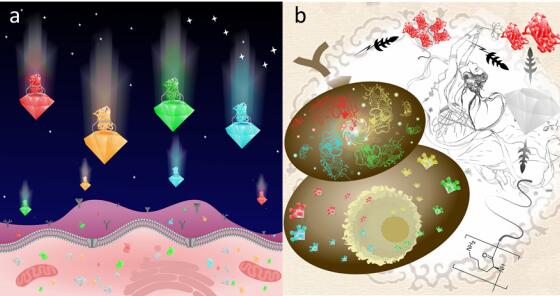Scientists Use Nanodiamonds for Intracellular Delivery of Protein
Direct delivery of functional proteins is of great interest in genome editing, cancer immunotherapy and stem cell reprogramming. However, intracellular delivery of intact and bioactive proteins, especially in vivo, has long been regarded as a major challenge, although it is superior to chemical- or gene-based drug delivery in many facets. A team of scientists, led by Dr. SONG Haiyun, from Shanghai Institutes for Biological Sciences, Chinese Academy of Sciences, and Dr. FAN Chunhai, from Shanghai Institute of Applied Physics, Chinese Academy of Sciences, has developed a convenient and highly efficient method for intracellular delivery of intact and functional proteins using poly-lysine functionalized nanodiamonds, which have successfully delivered functional proteins to the microenvironment of intestinal stem cells via oral administration.
Most proteins are unable to spontaneously cross the cell membrane. To circumvent this barrier, many types of nanocarriers for protein delivery have been studied, which nevertheless encounter several challenges. First, internalized nanocarriers tend to be trapped in the endosome/lysosome pathway that results in degradation of protein cargoes. Second, when proteins are chemically conjugated to nanocarriers, their biological activities and cellular functions are often hampered. Third, most studies focus on protein delivery in cultured cells, whereas their in vivo applications are less explored. Therefore, convenient protein delivery strategies with easy assembly, high efficiency of intracellular delivery, rapid endosomal escape, and improved in vivo efficacy are highly desirable.
Nanodiamonds (NDs) are a type of carbon nanoparticles with a truncated octahedral architecture. In this study, researchers explored the use of NDs as nanocarriers for direct intracellular delivery of proteins. They found that functionalized NDs were highly effective in delivering proteins into cultured cells and in vivo. Researchers also observed a novel phenomenon that a substantial amount of internalized NDs-protein complex rejected fusion with the early endosome, thereby evading protein degradation in the lysosome. Functionalized NDs can not only efficiently load proteins but show superior desorption of proteins in the cytosol, which ensures normal biological functions of delivered proteins.
Significantly, this method is effective for oral delivery of proteins and can be used to regulate intestinal stem cell microenvironment. Oral delivery of RNase A via NDs causes apoptosis in enterocytes, stimulates regenerative divisions in intestinal stem cells and triggers intestinal remodeling, which significantly increases the number of stem cells and precursor cells in the intestine. As stem cells are poorly accessible by exogenous agents in vivo, NDs-mediated oral delivery of proteins provides a new approach to modulate the stem cell microenvironment for intestinal remodeling, which has important implications for colorectal cancer therapy and regenerative medicine.
The study entitled “Nanodiamonds Mediate Oral Delivery of Proteins for Stem Cell Activation and Intestinal Remodeling in Drosophila”, has been published online in ACS Applied Materials & Interfaces on May 16.
This study was funded by National Natural Science Foundation of China, Ministry of Science and Technology of China and Chinese Academy of Sciences.

a) The ability of nanodiamonds for intracellular delivery of protein is comparable to that of the Space Gem of Marvel’s Infinity Gems.
b) Linear poly-lysine surrounding the nanodiamonds remind people the attire of flying apsaras found in Dunhuang frescoes. (Images provided by Dr. SONG Haiyun)
Contact:
Dr. SONG Haiyun, Principal Investigator
Shanghai Institutes for Biological Sciences, Chinese Academy of Sciences
320 Yueyang Road, Shanghai 200031, China
Email: hysong@sibs.ac.cn
